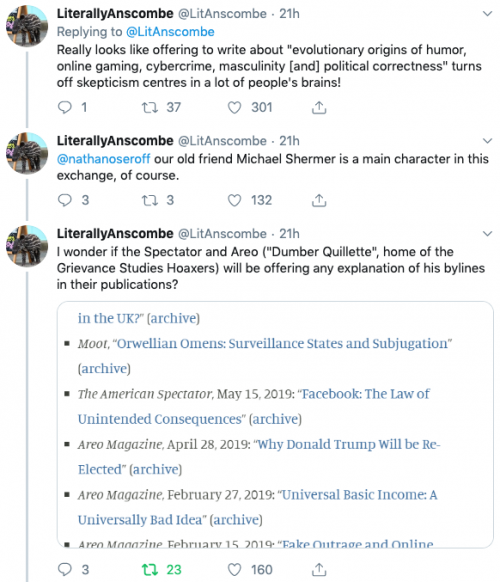I’ve probably seen the name “John Glynn” around — he was prolific, and was getting published all over the Rightosphere and elsewhere. He even got published in the Huffington Post, so some left-leaning pubs had stuff with his byline. But I would have sailed right over it, because his work was all bumblingly ideological and built on evolutionary psychology BS, which immediately flagged him as a charlatan, despite his claimed status as holder of a doctorate and professorships at several universities. Really, people, saying you’re a professor doesn’t make you infallible!
But some people, especially those gullible enough to favor EvoPsych and conservative positions, were taken in, including Michael Shermer.
I missed this in a truly remarkable week for politics, but Skeptic magazine was publishing somebody with fabulated credentials for three years presumably on the basis that he offered "evolutionary psychology" answers to contemporary issues. https://t.co/kmSIhbBKUi
— LiterallyAnscombe (@LitAnscombe) September 6, 2019
To his slight credit, Shermer exposed the guy as a fraud. He became suspicious, not when Glynn submitted glib garbage to his magazine, but when Glynn asked for a loan. You can lie about science all you want, but when you start eyeballing a right-winger’s wallet, their ultra-sensitive sensors start pinging. Anyway, it turns out with a few questions it was determined that Glynn did not have an advanced degree, and did not work for any university. Everything was a lie. He’d persevered in publishing crap all over the place, successfully, and fooled Skeptic magazine for three years. The key was offering to write stuff that catered to the biases of publishers, leaping right past any critical evaluation.
Look where else Glynn published! Areo, where the “grievance study” nonsense was published, where Helen Pluckrose is an editor. Quillette. The American Thinker. The Federalist.
The credibility of Skeptic magazine and Shermer has been nonexistent for years, and they’re cruising along on the support of people who still buy into the garbage Glynn was peddling, so they’ll be fine — in fact, they’ll probably be praising Shermer as a true skeptic for identifying the fraud, ignoring the fact that he’d been publishing him for years. John Glynn will be fine, since he’s an insubstantial, lying wraith. He’ll just invent another pseudonym and another set of fake credentials, and continue making contributions to the trash heap of bad media. So I’m chagrined to say that, while this revelation is amusing, it’s not going to make a speck of difference.




I’m afraid I can’t share the schadenfreude. No love lost for Shermer or evopsych, but as a matter of principle I view victims of fraud as victims. I worry that mocking victims contributes to the reluctance of victims to admit they were duped in the first place. Anyway, Shermer’s article suggests that the real credit belongs to his former grad students, so kudos to those two.
When I get interested enough to take a claimed researcher seriously, I usually look for background information on them. If they have a university position, then it’s easy, usually, to see if they are teaching classes or have ongoing projects and collaborators. If they have a linkedin page, that’s enough to follow up on. I have never seen anything written by John Glynn, and he was hard to Google just now because there are many others with the same name. John Anthony Glynn works better.
One thing to consider is that the burden of proof is on the person claiming credentials. If they’re that good, they ought to have peer-reviewed publications. I’ll assume Glynn does not, but anyway, there is really no excuse for getting hoodwinked. It is very easy to check if someone did serious research in the field they claim. They might offer some excuse for having a very low publication footprint, but it’s a red flag.
Take Sebastian Gorka, for instance. He’s a talking head, but basically a self-promoter and fraud, despite the “Dr.” affectation. And the simplest way to see that is just the lack of research output. The burden of proof is on the person claiming credentials.
This apology from Skeptic gives a good recipe for carrying out due diligence. They should consider doing it before they let someone publish with “PhD” after their name.
Parts of this story are hilarious. Shermer really wanted to believe. When the claimed “expert” asks you to spot him a loan, that is about as serious a red flag as I can think of.
I have worked with people who claim PhDs and I have had some trouble finding their dissertation, and in one or two cases I suspected they were PhD dropouts, but there was at least a little bit of an audit trail. This is about as a believable as a Nigerian email scam.
Siggy@1–
It depends on the fraud. I have nothing but sympathy for franchisees who see their businesses ruined when predatory executives gain control of the franchise (e.g. Retail Food Group), or contractors who find their bills are never paid because the company collapses after trading while insolvent (e.g. Kleenmaid), or pensioners whose funds have been gouged by fraudsters (e.g. Bre-X Minerals).
I have mixed sympathy for victims of financial scams that were too good to be true (e.g, Maddox, Enron, Worldcom); yes the victims were greedy and did not do due diligence, but they have still been swindled by sophisticated liars in positions of authority and in systems that were supposed to have regulators preventing these swindles.
I have zero sympathy for people who allow themselves to be scammed just because the scammers play on prejudices that they shouldn’t have in the first place. Anyone who publishes a magazine called Skeptic should not be publishing crappy evopsych parables by fake scientists. I give Shermer some credit for coming clean about it. But unless he admits his lengthy evopsych obsession is wrong, then he hasn’t really come clean on anything important and he’s still pushing his own dodgy science.
I am sure I have seen a video from a large skeptic conference from about 10 years ago with Sherma giving a talk and he asked how many libertarians there were in the audience; very few people put their hands up. He looked a bit shocked and said as much. That’s another bias Sherma has that the right (wrong) person could exploit.